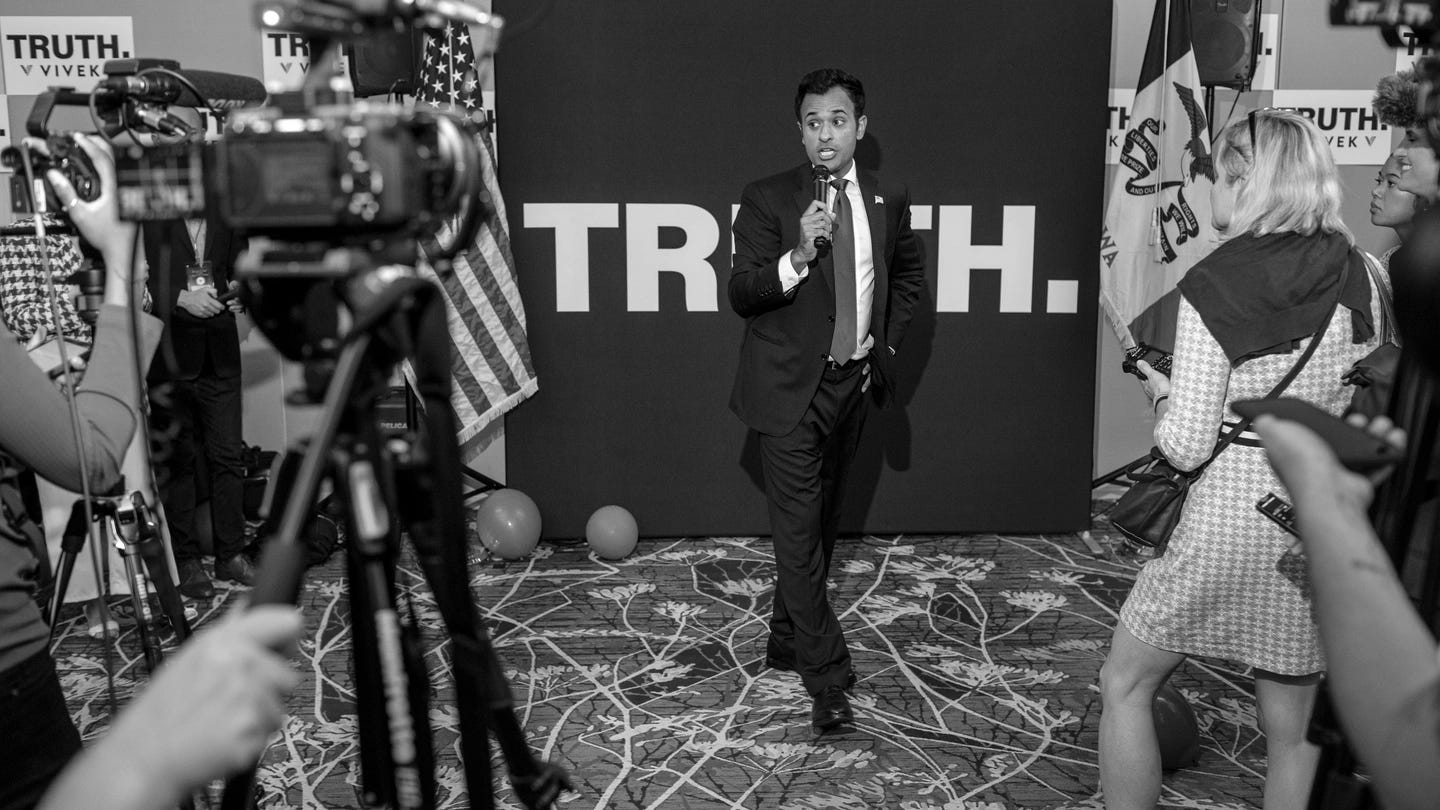The bullshit of Vivek Ramaswamy
And the delusion of Nadine Dorries
His was a “breakthrough performance” and he had won the debate. He had done this by garnering most of the attention, through being attacked by the others and by displaying (apparently) a kind of intellectual charisma. In the absence of Donald Trump, who is more likely to appear in a court than on a primary debate stage, the punditocracy almost unanimously decided that the 38-year-old biotech multimillionaire was the debate winner. A clutch of political pods began to cast excited episodes about him. Some poll-watchers even started to revise their estimate of whether Trump was catachable.
What people concentrated less on was what Vivek Ramswamy was actually saying – or rather, the plausibility of what he was saying. He was clear. He was confident. He had an answer for everything, delivered with the utmost conviction. He didn’t pause, not even for a moment’s reflection. It sounded plausible and that was enough to earn him the status of most interesting political newcomer. And where I seemed to see a character invented for a Disney Channel comedy series doing for presidential politics what Parks and Recreation did for local government, others saw something more credible.
Perhaps it is only when you dig into what Ramaswamy actually says that you realise what he represents. And by that I don’t mean what political constituency he is seeking to speak for – that’s obvious enough. He’s tea party Republicanism meets the Charles Lindbergh/Ron Paul isolationist tradition. In the 40s he'd have been accusing FDR of deliberately provoking the Japanese into attacking Pearl Harbour and hinting at the administration possessing foreknowledge which it turned a blind eye to because it wanted to take America to war.
No, I’m talking about the political style he represents, which you only really comprehend if you examine the tricks he uses. If no one asks him what the implications are of firing 75% of federal civil servants and disbanding the FBI, at least it should be clear enough that there would be huge consequences. It’s just that if you support Ramaswamy’s brand of libertarianism you might be willing to accept those outcomes. It is, you might say, arguable.
But arguing the arguable is not his main mode. The best illustrations of that come in Ramaswamy’s forays into foreign policy. Let’s take Mr R on Ukraine. He advocates cutting off all aid to the Ukrainians on the basis that theirs is not an American fight. A peace deal should be brokered “freezing along the current lines of control” – ie gifting Russia Crime and most of the Donbas, and normal relations should be restored with Vladimir Putin’s government.
To counter the charge that this would be a capitulation to Russian aggression Ramaswamy argues that there would be a condition attached which would be immensely favourable to the United States. This would be that Russia cease its “military alliance” with the real enemy, “communist China”. If it does that, it can have the bits of Ukraine it currently occupies. At a single stroke the US would achieve a major strategic objective.
In all the interviews I’ve seen Ramaswamy do where this has come up (and he has done loads; the man never turns down an appearance) no one has pointed out the singular problem with this trade-off. Which is that there IS no military alliance between Russia and China. It doesn’t exist. Which is why no military assistance has been rendered by China to the Russians during this long and punishing war. Those wanting the full details of its non-existence will find them here in this multi-authored document produced by Chatham House:
For those without the time to read the full document these points summarise its contents:
Moscow and Beijing have never formally committed to lend each other military assistance, nor have they created integrated military structures for potential joint action. Neither is there evidence of a credible informal commitment to take each other’s side in the event of a military confrontation with the US and NATO.
…Moscow and Beijing have divergent interests and cost–benefit calculations in their policies vis-à-vis the US and NATO. Furthermore, the relationship between Moscow and Beijing lacks a reliable and sufficient foundation of trust, while it includes a non-negligible element of competition, too…
Russia’s war against Ukraine clearly demonstrates the limits of Russian–Chinese military cooperation, and how unrealistic the idea of Russia and China joining forces against the West is. There is no evidence that China is helping Russia to replace the hardware it has lost in the war, either by supplying armaments or by providing highly needed dual-use goods… Furthermore, since the start of the war in 2022, joint exercises between Russia and China have not been extended, but rather downsized.
So there is simply no quid for Ramsawamy’s quo. He just made it up so as to have an available answer to the obvious objection to rewarding Putin for Russia’s naked aggression. After that all he needs to do is hope that no one actually checks.
A similar pattern can be seen in his commitment not to defend Taiwan after 2028 in the eventuality of a Chinese attack. Once again there is a supposed trade-off, which is that in the four years before 2028 the US under a Ramaswamy administration will build up a chip industry big enough to replace those currently imported from Taiwan. Again there is an upside for Fortress America from withdrawing from its foreign entanglements and once again it’s an upside that doesn’t exist.



